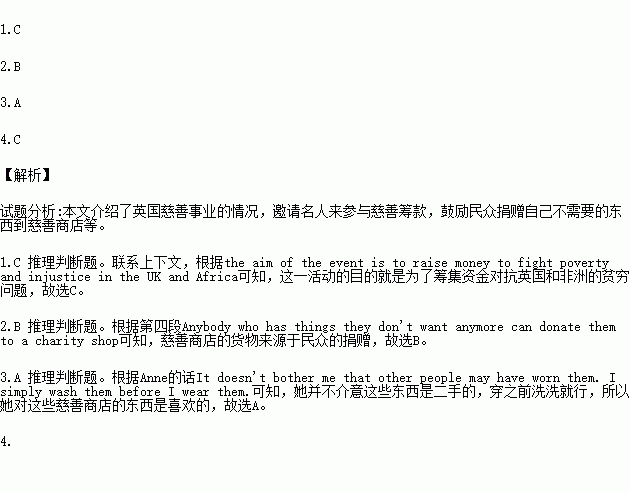题目内容
If you watch British television on March 15, you might be surprised to see celebrities(名人) wearing funny red noses and joking; around. But don't worry. They're not mad. It's all part of a money raising event called Red Nose Day.
Founded in 1985 by two British comedians, the aim of the event is to raise money to fight poverty and injustice in the UK and Africa. Celebrities and public figures support the event by making appearances on comic TV shows. For example, UK Prime Minister David Cameron once appeared in a music video by One Direction, which the band produced for the event.
Britons don't just raise money for charitable causes on one day a year, but they do it all year round. One way of doing so is by shopping in charity shops. These small shops sell clothes, books and household goods just like any other shop except that it's all secondhand.
There are nearly 10,000 charity shops in the UK. Their business model is simple: Anybody who has things they don't want anymore can donate them to a charity shop, where they are checked for damage, cleaned and priced. The money that is made by selling them is used for a charitable cause.
The idea of buying used clothes may sound unpleasant, but for shoppers who have less spending money, it has been a welcome option. Now, shopping at charity shops is also becoming popular with young people looking for alternative fashion. "You can find very unique clothes for a very cheap price. It doesn't bother me that other people may have worn them. I simply wash them before I wear them." said Anne Marie, a 19-year-old from the US.
So next time you spot a charity shop, why not go inside? Who knows, you might find a lovely dress for just a few pounds. Even better, you can enjoy wearing it in the knowledge tha t your money helped a good cause.
1.Why did Cameron appear in One Direction's music video?
A. To earn a living. B. To support the band.
C. To help raising money. D. To entertain the audience.
2.Where are the goods of charity shops from?
A. Local bands. B. People's donation.
C. British comedians. D. The UK government.
3.What's Anne Marie's attitude to charity shops?
A. Favorable. B. Particular.
C. Doubtful. D. Disapproving.
4.What is the text mainly about?
A. Red Nose Day. B. British celebrities.
C. Charity in Britain. D. Secondhand shops.
 阅读快车系列答案
阅读快车系列答案请根据句意,选择方框中的单词,用其正确的形式填入下面的句子的空白处,并将答案写在相应位置。
absorb, intend, accuse, approach, amuse, conclude, thorough |
1.This dictionary is __________ for senior high students.
2.It’s too cold for children to play outside today, so they have to __________ themselves indoors.
3.Tony __________ Julia, touched her shoulder and kissed her on the cheek!
4.Once my neighbour next door __________ me of playing the piano too loudly in my room.
5.Having been __________ cleaned, the garden looked more beautiful than ever before.
6.It seems reasonable to __________ that people’s behaviour is influenced by what they see on TV.
7.He was so __________ in reading a novel that he didn’t notice his teacher coming up to him.

